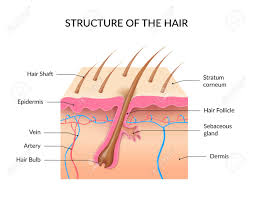Introduction
Hair loss occurs to both men and women. Most people begin to feel very self-conscious about their appearance. This is very natural. Hair loss can occur for many reasons. There are some treatments that may help.
What is the structure of hair follicles?

The hair follicle has multiple parts that aid in its growth. Hair itself is made of keratin. It sits in a follicle that anchors it to the skin. The bulb is in the base of the hair shaft. The hair bulb contains cells that divide to grow the hair shaft. Blood vessels lie near the hair bulb to provide nutrients and deliver hormones that aid in growth. Hair growth has 3 stages. They are called anagen, catagen, and telogen. The anagen phase is the growth phase. Catagen is the transitional phase where the hair growth slows and the follicle shrinks. Telogen is also known as the resting phase. This is when hair growth stops and the hair falls out.
What causes hair loss?
There are many causes of hair loss. There are diseases, like alopecia, that may be autoimmune although the full cause is unknown. Stress can also cause hair loss. Stress can come in many forms. This stress could be actual emotional stress or stress to your body in the form of sudden weight loss or nutritional deficiency. Hormonal and genetic causes can cause male pattern baldness and female pattern baldness.
What are the treatment options for hair loss?
There are many treatment options for hair loss. The one most people are familiar with is Rogaine. Rogaine works by dilating the vessels that provide the nutrients to the hair follicle. While the exact mechanism is unknown, the theory is that it works by enlarging the hair follicles and increasing the length of the growth, or anagen, phase. People can also get hair transplants, otherwise known as hair plugs. This option transplants healthy follicles from the back of the
head to the parts in which the follicles have fallen out. Human Growth Hormone is a new treatment that people are turning to that has ongoing scientific research.
What is Human Growth Hormone?
Human Growth Hormone (hGH) is a hormone that, as one might expect, stimulates growth. It works on many different parts of the body and is essential as children are growing into adults. The secretion of hGH is regulated by the brain and works on the muscle, liver, and ultimately the bones. It also interacts with many other hormones, so its effects can be felt throughout the body.
What happens when there is a change in hGH?
Too much hGH can cause thickened bone growth in the face, forehead, hands, feet, increased sweating, muscle weakness, and type 2 diabetes, among other things. Too little hGH can cause growth failure in children, weak bones, decreased muscle mass and increased fat, and other issues.
How can it help hair loss?
Research has a number of theories as to how Human Growth Hormone affects hair growth, and thus hair loss. Human Growth Hormone works on the liver to cause the liver to release a hormone called Insulin-like Growth Factor (IGF). There are multiple types of IGF. IGF-1 is known to cause hair follicles to proliferate and influence the growth cycle of the hair follicle. People with a IGF-1 deficiency and a hGH deficiency have decreased hair growth compared to individuals without those hormonal deficiencies.
Other research has shown that hair follicles grew more when stimulated by insulin. They actually found that this was a dose dependent relationship, meaning that more insulin resulted in more growth. This study found that IGF-1 did not cause hair follicles to grow. However, it did show that IGF-1 prevented hair from going into the catagen phase, where hair growth slows and the follicle shrinks.
Other research on children with growth hormone deficiency has shown that there might be an element of zinc metabolism involved with hair loss. This study found that administering hGH to hGH-deficient children increased the zinc concentration in their hair shafts. This finding was similar to the effect of testosterone on zinc concentration. They propose that growth hormone and hormones like testosterone affect hair growth in part by affecting the zinc metabolism.
More research needs to be done to solidify the relationship between hGH, hair follicles, and mineral metabolism. This research is ongoing, and new information is being discovered every day.
How can I learn more?
Hair loss can trigger feelings of self-consciousness in people experiencing it. Human Growth Hormone and hair loss is an ongoing field of research. At the Anti-Aging and Wellness Clinic, we pride ourselves on delivering care according to the latest research. Contact us today to learn more about hair loss and how we can help you reach your goals.
Contact here to learn more about human growth hormone therapy.
Facebook: Li faye
⇒ https://www.facebook.com/customizedsupplierFaye
WhatsApp(Telegram):+8615820109590
Email: fayefaye@custompeptidestech.com


评论
发表评论